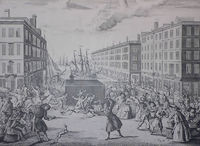Annotation:Billingsgate: Difference between revisions
(Created page with "=='''Back to [[{{BASEPAGENAME}}]]'''== ---- <p><font face="garamond, serif" size="4"> '''BILLINGSGATE.''' AKA - "Billings-Gate." English, Country Dance Tune (cut time). <br> ...") |
m (Text replacement - "garamond, serif" to "sans-serif") |
||
| (3 intermediate revisions by one other user not shown) | |||
| Line 1: | Line 1: | ||
=='''Back to [[{{BASEPAGENAME}}]]'''== | =='''Back to [[{{BASEPAGENAME}}]]'''== | ||
---- | ---- | ||
<p><font face=" | <p><font face="sans-serif" size="4"> | ||
'''BILLINGSGATE.''' AKA - "Billings-Gate." English, Country Dance Tune (cut time). | '''BILLINGSGATE.''' AKA - "Billings-Gate." English, Country Dance Tune (cut time). G Major. Standard tuning (fiddle). AAB. The tune was published in all four editions of John Young's '''Second Volume of the Dancing Master''' (1710-1728), and in rival publishers Walsh and Randall's '''The New Country Dancing Master, Second Book''' (1710), and Walsh and Hare's ''' Second Book of the Compleat Country Dancing-Master''' (1719). | ||
<br> | |||
<br> | |||
[[File:billingsgate.jpg|200px|thumb|left|Billingsgate c. 1734]] | |||
Billingsgate [http://en.wikipedia.org/wiki/Billingsgate] is an area in London on the banks of the Thames River. It was the site of a raucous fish market in the early 18th century, and, according to E. Cobham Brewer ('''Dictionary of Phrase and Fable''', 1898), the derivation of the name is ''Gate'' = quay, and ''bellan'' is to bawl or bellow. The market was notorious for the vulgarity of the language heard there; it was so infamous that 'billingsgate' was used as a synonym for vulgarity, as in "That's billingsgate" (to talk vulgarly), or "You are no better than a Billingsgate fish-fag," i.e. you are as rude and ill-mannered as the women of Billingsgate fish-market [Brewer]. | |||
<br> | |||
<br> | <br> | ||
</font></p> | </font></p> | ||
<p><font face=" | <p><font face="sans-serif" size="4"> | ||
''Source for notated version'': | ''Source for notated version'': | ||
<br> | <br> | ||
<br> | <br> | ||
</font></p> | </font></p> | ||
<p><font face=" | <p><font face="sans-serif" size="4"> | ||
''Printed sources'': Young ('''Second Volume of the Dancing Master, 1st edition'''), 1710; p. 139. | ''Printed sources'': Young ('''Second Volume of the Dancing Master, 1st edition'''), 1710; p. 139. | ||
<br> | <br> | ||
<br> | <br> | ||
</font></p> | </font></p> | ||
<p><font face=" | <p><font face="sans-serif" size="4"> | ||
''Recorded sources'': <font color=teal></font> | ''Recorded sources'': <font color=teal></font> | ||
</font></p> | </font></p> | ||
Latest revision as of 11:17, 6 May 2019
Back to Billingsgate
BILLINGSGATE. AKA - "Billings-Gate." English, Country Dance Tune (cut time). G Major. Standard tuning (fiddle). AAB. The tune was published in all four editions of John Young's Second Volume of the Dancing Master (1710-1728), and in rival publishers Walsh and Randall's The New Country Dancing Master, Second Book (1710), and Walsh and Hare's Second Book of the Compleat Country Dancing-Master (1719).

Billingsgate [1] is an area in London on the banks of the Thames River. It was the site of a raucous fish market in the early 18th century, and, according to E. Cobham Brewer (Dictionary of Phrase and Fable, 1898), the derivation of the name is Gate = quay, and bellan is to bawl or bellow. The market was notorious for the vulgarity of the language heard there; it was so infamous that 'billingsgate' was used as a synonym for vulgarity, as in "That's billingsgate" (to talk vulgarly), or "You are no better than a Billingsgate fish-fag," i.e. you are as rude and ill-mannered as the women of Billingsgate fish-market [Brewer].
Source for notated version:
Printed sources: Young (Second Volume of the Dancing Master, 1st edition), 1710; p. 139.
Recorded sources:
